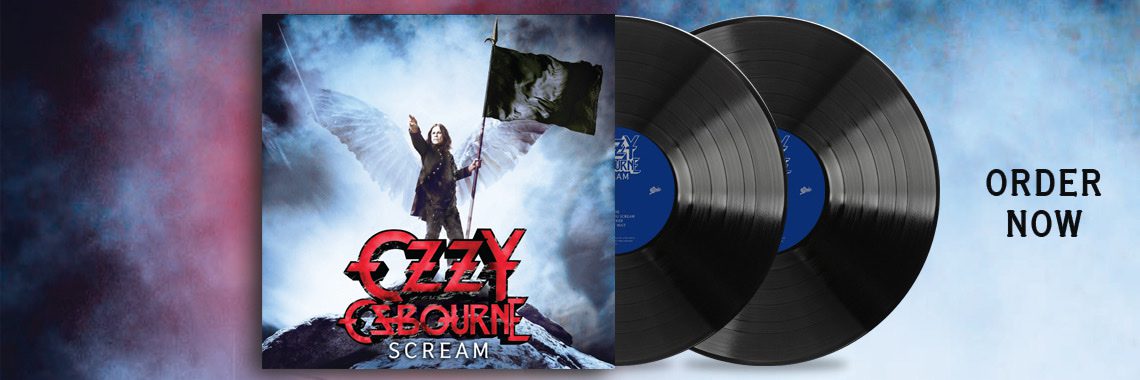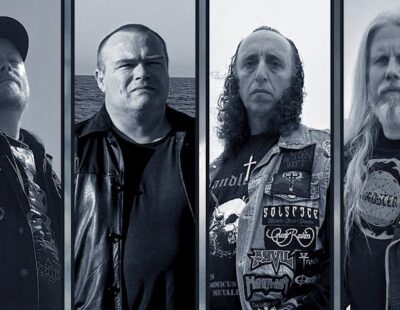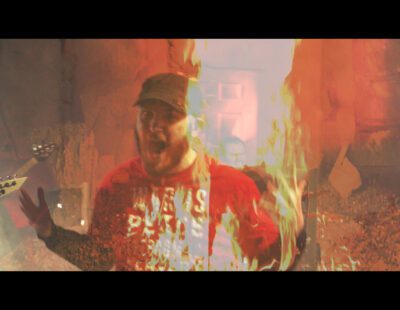When Bastard Priest dropped the five-track Merciless Insane Death demo through Zombie Ritual Tapes in 2008, the duo left an almighty crater for all crusty death-heads to fall into and over each other. Genre veterans spent days nursing the shell-shock associated when detonating explosive underground death metal finds. It was a bitch, for a week or two it made all your other records seem slow and boring, overworked and overcooked; here was the real deal crust and hammer-riff, the pieced together fucking artwork—put together by the guitarist/bassist, some guy calling himself Inventor, rivaling Portal’s the Curator as metal’s most ill-fitting/weird nom de guerre. The drummer, Matt Mendoza, took his name from Twisted Sister’s bassist. Fuck all was known about them. And while the release of Under the Hammer of Destruction in 2010 fleshed out the hype, and the demo, they’ve still remained kinda anonymous, as individuals anyway.
Ghouls of the Endless Night—out on vinyl through Blood Harvest— is just about to be released on CD through Pulverised, and sees their métier shift from war-inspired hyper-intense crust/death to zombie horror-inspired hyper-intense crust/death, so we called up Mendoza to see what’s what—who is Inventor, and when will people realize that it’s OK to reconcile an appreciation of Twisted Sister as the best Friday night band, ever, while keeping the company line strictly necro. Even through the morbid glut of old-school death metal resurrections, Bastard Priest make themselves heard and folks that’s fucking impressive. Just don’t count on them visiting a dive near you anytime soon.
Bastard Priest “Visions of Doom” from Under the Hammer of Destruction
https://youtu.be/myHbwTciKkU
Bastard Priest “Ghouls of the Endless Night”
https://youtu.be/hKCh4ipHrEc
Since the Merciless Insane Death demo, there’s been a lot of expectation surrounding Bastard Priest, did you feel any pressure when writing this album?
Matt Mendoza: Writing this album? Well I guess some pressure but I think that was mainly from myself. I’m pretty hard on myself when I do creative things. I’m a bit of a control freak and want everything to be perfect. I am not sure it is from releasing what some people consider a good demo has much to do with it, it’s more me putting a lot of pressure on myself.
What’s the writing relationship like between you and inventor?
MM: Well it’s usually me and Inventor doing riffs, recording them into our cellphones, putting it into the computer and cleaning it up. Every once in a while I’ll go up to his place, because we’ve got this rehearsal space up in the north of Sweden, and we’ll record ourselves. We’ll do a couple of demos and decide when it’s time to do a real, proper recording. Yeah, I think it’s like how most bands do, come up with a few demos and then get ready. A lot of the fine details, like leads and solos and lyrics, stuff like that, that doesn’t matter until we actually record. It’s nothing special, really, there’s no hidden cave where we worship some ancient god or something like that. It’s just rock music, and recording it. Usually I come up with the basic riffs and ideas, and the funny thing is I play stuff for Inventor, he usually—often by mistake, maybe not intentionally—plays them a little off, a little wrong, it puts a special flavor to it and comes out in a totally different way from when I first thought about it. That gives it a bit of a dynamic between he and I.
What’s this Inventor character like as a person? He’s pretty much a mystery!
MM: Yeah! He’s the stable guy, he doesn’t necessarily have the most technical skills or blazing fingers and shit, but he can do what he can do really good. He plays with attitude, a punk attitude. We’ve known each other for ten years or more now, I guess, and we’ve been playing music together in the course of different bands and shit—we know each other pretty well by now, I guess.
Have you thought about adding to the line-up, to tour or whatever?
MM: We have thought about getting more members and such to do live shows but we decided not to—I dunno, I think we should have done that a couple of years ago. It’s never too late but I don’t know.
Would it dilute the idea if more people were involved?
MM: Yeah, it’s more of a project and to be honest we’re not 20 years old anymore, we’ve got jobs and lives, and live together with girlfriends and shit, so it’s harder now to live that kind of life that you have to live when you’re on tour all the time, when you really dedicate yourself to being out there and playing. That’s kinda not an option. We don’t have to do it that way; we keep getting offers to play big festivals and shit but that is, I dunno, it’s all or nothing. Like, it’s easier to play shows or just don’t, rather than playing one show or two shows a year—it’d get kinda corny I think.
That non-touring duo construct really works for Darkthrone so why not you?
MM: Not to play shows? Yeah, that those guys do that and don’t play shows, I wouldn’t say it’s an inspiration but it’s like, when someone does that it gets more OK not to do shows.
Does this give you the chance to become a bit more prolific and release more albums?
MM: When you don’t tour you get a lot more energy, time and inspiration for just doing some songs, recording them and doing it well. Except, to tour, if you have a tour coming up or a show coming up then you have to have a new release out for that, so it’s a different time schedule when you have to tour and play shows. That activity demands that you release certain releases at certain times, and I mean I could start working on the next Bastard Priest album tomorrow, and have it released in three years: it doesn’t matter. And I could have it released in a week because we don’t have to go on tour. That’s a big pro for being a band that doesn’t do live shows or tours because we can focus 100 per cent on the songwriting and the recording.
In terms of the actual scene, it keeps you out of it—would you consider taking on other projects?
MM: Yeah well when Bastard Priest started it was just a fun thing to see if we could do death metal. “Oh shit, we can—let’s do it again!” It was so much fun. And then it’s just grown and people like you start calling in the middle of the night.
It’s funny you mention fun—a lot of people take death metal too serious.
MM: Oh yeah, death metal’s ridiculous, and that’s why I love it. I have a very hard time with very serious bands, all this religious crap and shit like that. It’s just not my thing at all. I wanted to play rock’n’roll-based music, and if you can’t see the connection between Little Richard and the first Sepultura album or Bastard Priest or whatever, Morbus Chron’s new album, if you can’t see that connection you need to check up on some music history.”
Could you see yourselves changing styles a bit, like Darkthrone?
MM: I would think it would be a little unfair to anyone who likes Bastard Priest if we were start to play Flipper, Nirvana, indie-rock or noise rock, but on the other hand if there was one other band that I would like to do noise-rock with it would be Bastard Priest. I guess you never know!
Your snare sound has a touch of the Dave Grohl about it.
MM: You think so!? That’s the best compliment ever—I fucking love Dave Grohl. There’s a real special snare sound on Under the Hammer…. It got totally fucked up on the mastering, I don’t know what happened.
Ghouls of the Endless Night sounds great.
MM: That was the thing about having Fred Estby mixing it, he would bring out sounds that we didn’t think were there. I remember, I think it’s the third song “Enter Eternal Nightmare”, when I play fast it’s almost just the microphone that’s underneath the snare—because you have one microphone on top of the snare and one under—that captures the fussy sound of the snare, I don’t know the terms in English but it doesn’t sound really good but you add it just to get a distorted sound on your snare drum. It sounded like that. I said, “Don’t you think the under mic is too high in the mix?” and he says, “I don’t use the under mic, this is just how the snare sounds’, just because it was going through his mixing gear and stuff. I was like that’s so weird—he did an awesome job for us, mixing the thing.
Did it help you having a drummer mix the record?
MM: I think so, because the drums are really loud and that’s typical for drummers who mix.






